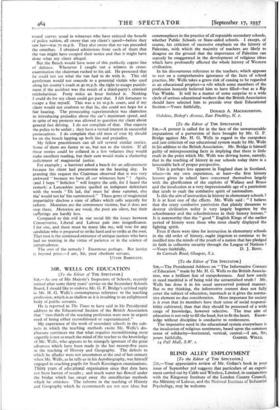MR. WELLS ON EDUCATION [To the Editor of THE SPECTATOR.]
SIR,—As one of His Majesty's Inspectors of Schools, recently retired after some thirty years' service on the Secondary Schools Board, I should like to endorse Mr. G. F. Bridge's spirited reply to Mr. H. G. Wells's contemptuous reference to the teaching profession, which is as shallow as it is insulting to an enlightened body of public servants.
He is reported in The Times to have said in his Presidential address to the Educational Section of the British Association that " two-thirds of the teaching profession were now in urgent need of being either reconditioned or superannuated."
My experience of the work of secondary schools in the sub- jects in which the teaching methods excite Mr. Wells's dis- pleasure convinces me that what requires reconditioning most urgently is not so much the mind of the teacher as the knowledge of Mr. Wells, who appears to be strangely ignorant of the great advances which have been made in the last twenty-five years in the teaching of History and Geography. The defects to which he alludes were not uncommon at the end of last century when Mr. Wells, as he tells us in his Autobiography, was himself engaged in coaching pupils for South Kensington examinations. Thirty years of educational organisation since that date have not been barren of results ; and much water has flowed under the bridge which has swept away the antediluvian methods which he criticises. The reforms in the teaching of History and Geography which he recommends are not new ideas but commonplaces in the practice of all reputable secondary schools, whether Public Schools- or State-aided schools. I except, of course, his criticism of excessive emphasis on the history of Palestine, with which the majority of teachers are likely to disagree on the ground that the importance of Palestine can scarcely be exaggerated in the development of religious ideas which have profoundly affected the whole history of Western civilisation.
In his discourteous reference to the teachers, which appears to rest on a comprehensive ignorance of the facts of school practice, Mr. Wells takes a grave risk of ceasing to be regarded as an educational prophet—a role which some members of the profession honestly believed him to have filled—but as a Rip Van Winkle. It will be a matter of some surprise to a wide circle of serious educational workers that the British Association should have selected him to preside over their Educational Section.—Yours faithfully, DONALD A. MACNAUGHTON.
Oakdene, Bishop's Avenue, East Finchley, N. 2.










































 Previous page
Previous page